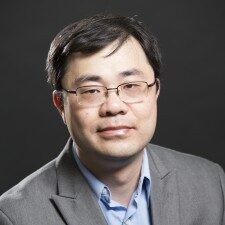Associate Professor
Director, Laboratory of Trustworthy Cyber-Physical Systems and Infrastructures
Dept. of Electrical Engineering and Computer Science
Phone: (414) 229-7390
Email: [email protected]
Lingfeng Wang , Ph.D.
University of Wisconsin-Milwaukee
Dr. Lingfeng Wang is currently an Associate Professor in the Department of Electrical Engineering and Computer Science at the University of Wisconsin-Milwaukee (UWM), where he directs the Laboratory of Trustworthy Cyber-Physical Systems and Infrastructures. He also serves as a Co-Director for the Department of Energy (DOE) Industrial Assessment Center at UWM. He received his Ph.D. degree from the Electrical and Computer Engineering Department at Texas A&M University in 2008. Dr. Wang is an Editor of IEEE Transactions on Smart Grid, IEEE Transactions on Power Systems, and IEEE Power Engineering Letters, and he serves on the Steering Committee for IEEE Transactions on Cloud Computing. He is also on the Editorial Board for several other international journals including Sustainable Energy Technologies and Assessments (Elsevier) and Intelligent Industrial Systems (Springer). Dr. Wang served as a member of technical program committee for numerous conferences, and a Guest-Editor-In-Chief for several international journals. He has given seminar talks in more than 80 universities, industrial companies, and national laboratories as an invited speaker.
Dr. Wang's research is primarily focused on addressing the challenging issues related to the emerging fields of cyber-physical systems applied to national critical infrastructures, including electrical energy systems, drinking water distribution systems, wastewater reclamation facilities, natural gas distribution networks, intelligent and sustainable transportation, healthcare systems, smart manufacturing, intelligent and energy-efficient buildings, smart cities, etc. The key to this research is to build valid models capable of reflecting the true interactions between the cyber and physical portions of the integrated system. His research team is also working to build comprehensive, stochastic models for capturing the interdependencies among critical infrastructures (e.g., water-energy nexus) in order to improve their resiliency in the presence of natural or man-made disasters. He is the author or co-author of more than 300 technical publications in these research fields.
